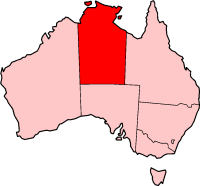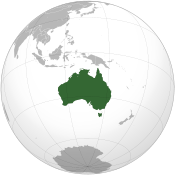Culture of violence reported in central Australian Aboriginal communities
Wednesday, May 17, 2006
Australian media reports that a recently leaked Northern Territory police briefing paper exposes "shocking" cases of sexual abuse and violence against women and children in remote Australian Aboriginal communities.

Central Australian Crown prosecutor, Dr Nannette Rogers, alleged a range of "dreadful" cases she has heard of. Her paper claims details of abuse (over a 15-year period), including the rape of a seven-month-old baby, and the sexual assault and drowning of a girl by an 18-year-old man. The report refers to a disturbingly abusive and secretive Indigenous male culture. She says a "web of kinship" has helped to create a "conspiracy of silence" and that Aboriginal communities were suffering from "tragedy fatigue," allowing horrific crimes to appear unremarkable.
"It doesn't augur well for Aboriginal people to be functional human beings with the attributes of turning around and caring for children themselves," she said. "The child grows up seeing violence done to him or her and having violence done to him or her."
Tangentyere Council chief executive William Tilmouth says it is appalling behaviour. "It's a behaviour that's got to stop, it's behaviour that denigrates the family, as well as the women," he said.
Alcohol, Law and Order
Senior Indigenous elder Margaret Kemarre said, "There are more violence and there's no respect for people around here, no respect for elders and no respect for parents, as we see it now, and it's, you know, it's getting more and more," she said. "I think the grog (alcohol) is really taking away all our families. It's really destroying us." Ms Kemarre says the answer to the problem apart from reducing the amount of alcohol in central Australia, is tougher sentencing by the white justice system.
Jane Lloyd, from Ngaanyatjarra Pitjantjatjara Yankunytjatjara Women's Council, said more police are necessary to help restore law and order in remote communities, particularly the remote outstations. "There is a history and tradition of violence, especially in Western Desert cultures. It's become more extreme," Ms Lloyd said.
Australia's Federal Indigenous Affairs Minister Mal Brough, says there are indeed problems with policing. "You go into a community here in the Territory of over 2,500 people and there's not one policeman," he said. Mr Brough says the Federal Government has started working with the NT Government over housing and other matters, but something needs to be done urgently about alcohol.
Northern Territory Chief Minister, Clare Martin, says slow progress is being made. "We are taking much stronger measures on alcohol," she said. "Talking to the Aboriginal community over the last couple of months in Alice Springs, the community is very concerned about the impact of alcohol and have decided that enough is enough - that we have to stand up and take tough measures." She said there was no simple solution to the problems of violence, abuse, and alcoholism plaguing many indigenous communities.
Mick Gooda, of the Cooperative Research Centre for Aboriginal Tropical Health, says dysfunctional Aboriginal communities should be shut down. "Children are at risk... they should be removed from their families," he said. "We should not shy away from these hard decisions on the basis that we might be creating another stolen generation. I think what we're talking about here is kids being removed from risk situations." Lyla Coorey, author of a 2005 Federal Parliamentary report on the extent of child sexual abuse in Indigenous communities, say the reasons that child sexual abuse is more prevalent in Aboriginal remote communities are numerous. "We must look at the factors that particularly make Indigenous children vulnerable to ongoing abuse, she told ABC radio. "I think we need to look at all aspects of Indigenous children's lives. And it will become apparent that they are probably singularly the most disadvantaged group of Australians."
"You look at perhaps the social environment that they're growing up in. They're surrounded by neglect, parents who are involved in heavy substance abuse. And I think that in itself is a major issue," said Ms Coorey "And I think if you attempt to examine why that is the case you will find that a number of adults, Indigenous adults, are still suffering and still reeling from their own experiences of child sexual abuse."
Traditional owner Betty Pearce says, "This is not an Aboriginal culture. Twenty years ago, ...had an Aboriginal person done that, he'd have been killed - had he raped a child."
Claims of "paedophile rings"
Indigenous Affairs Minister Mal Brough has alleged on ABC Television that "pedophile rings were working behind a veil of customary law." Mr Brough says he does not want to steamroll the Territory government but that he will do "whatever it takes" to tackle the abuse of Aboriginal children.
NT Chief Minister Clare Martin said Mr Brough had been incredibly irresponsible. "We have no evidence of that," she told Southern Cross Broadcasting. "Two weeks ago Mal Brough had quite a session with our police commissioner, didn't mention (it). He had a long session with me, didn't mention it, (then) goes on national television, can't say where it came from, and under our law it must be reported." If Mr Brough had evidence of pedophile rings, he had an obligation to report it, Ms Martin said.
Opposition Leader Kim Beazley described Mr Brough's claims as libel. "There is nothing in Aboriginal customary law that justifies abuse," he said. "Aboriginal customary law regulates relations between the genders quite strictly and protects people in a situation where they are not yet physiologically adults. The argument that somehow or other these events relate to Aboriginal customary law (is) libel. They don't."
The Northern Territory Police Association says Mr Brough's comments are offensive and ignorant. "Mr Brough claims that our members turn a blind eye to crime in Aboriginal communities," association president Vince Kelly said. "That is the most ridiculous claim I have ever heard from a federal indigenous affairs minister." Police often did not have the evidence to arrest suspects, Mr Kelly said. "To suggest police turn a blind eye to crime in Aboriginal communities is nothing short of insulting. To suggest our members apply the law differently in Aboriginal communities is ignorant and displays an absolute lack of understanding of the operational realities our members face in isolated Aboriginal communities, often dealing with complex tribal systems," he said.
Australian Greens Senator Bob Brown said that the focus on Aboriginal social breakdown, including rape, paedophilia and destructive drug addiction has to broaden to include white exploitation, profiteering and disdain for Aboriginal culture.
"We are 11 years into Mr Howard's Prime Ministry. His most memorable early contribution to this outrageous situation was to reject what he labelled 'black armband' view of history. The problem is he turned the black armband into blinkers," Senator Brown said. "The Prime Minister should lift this issue to the top his personal agenda. The plight of the First Australians is a national disgrace. Australia must restore health, safety and dignity to Aboriginal Australians."
Sources
- "Brough speaks out against Indigenous 'paedophile rings'" — Australian Broadcasting Corporation, May 17, 2006
- "Child abuse in Indigenous communities a pressing concern" — Australian Broadcasting Corporation, May 17, 2006
- "Child abuse a 'national problem'" — The Australian, May 17, 2006
- "No evidence of indigenous paedophile rings: Martin" — The Sydney Morning Herald, May 17, 2006
- "Indigenous Australia crisis - national response must be lead by PM" — Greens Media Release, May 17, 2006
- "Abuse claims 'not linked to tribal law'" — The Australian, May 17, 2006
- "Brough insulting, ignorant: NT police" — News.com, May 17, 2006
- Simon Kearney and Ashleigh Wilson. "Raping children part of 'men's business'" — The Australian, May 16, 2006
- "Indigenous groups warn violence worsening" — ABC Messagestick, May 16, 2006
- "Culture of violence revealed in central Australia" — Australian Broadcasting Corporation, May 16, 2006



